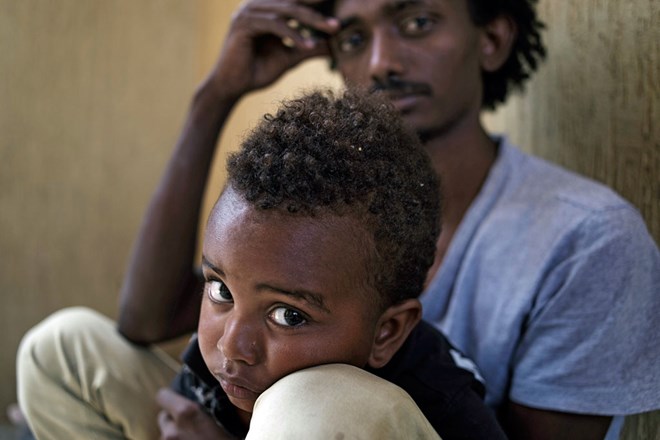
Wednesday, September 07, 2016

In Libya, Addis, holds his 30-month-old son, Lato, sits in a cell at the Alguaiha detention centre in the coastal town of Garabulli on the north-western coast. UNICEF/UNI187398/Romenzi
Millions of children driven from their homes due to violence and conflict or in the hopes of finding a better and safer future face further dangers along the way – including the risk of drowning on sea crossings, malnourishment and dehydration, trafficking, kidnapping, rape and even murder – according to the new report from the United Nations Children's Fund (UNICEF).
“Indelible images of individual children – Aylan Kurdi's small body washed up on a beach after drowning at sea or Omran Daqneesh's stunned and bloody face as he sat in an ambulance after his home was destroyed – have shocked the world,” UNICEF Executive Director, Anthony Lake, said today in a news release issued by the agency.
“But each picture, each girl or boy, represents many millions of children in danger – and this demands that our compassion for the individual children we see be matched with action for all children,” he added.
According to the news release, the report Uprooted: The growing crisis for refugee and migrant children presents a sobering picture of the lives and situations of millions of children and families affected by violent conflict and other crises that make it seem safer to risk everything on a perilous journey than to remain at home.
According to the report, nearly 50 million children, across the globe, have migrated across or within borders, or been forcibly displaced. More than half that number – 28 million – are boys and girls who have fled violence and insecurity.
It further notes that more and more children are crossing borders on their own. In 2015, over 100,000 unaccompanied minors applied for asylum in 78 countries – triple the number in 2014. Unaccompanied children are among those at the highest risk of exploitation and abuse, including by smugglers and traffickers.
In terms of the geographic spread, the report notes that Turkey hosts the largest total number of recent refugees and very likely the largest number of child refugees in the world. Furthermore, relative to its population, Lebanon hosts the largest number of refugees by an overwhelming margin: roughly 1 in 5 people in Lebanon is a refugee.
Migration also offers opportunities
Analysing the impact of migration, the report argues that where there are safe and legal routes, migration can offer opportunities for both the children who migrate and the communities they join.
For instance, it found that in high-income countries, migrants contributed more in taxes and social payments than they received; filled both high- and low-skilled gaps in the labour market; and contributed to economic growth and innovation in hosting countries.
“But, crucially,” UNICEF flagged in the news release, “children who have left or are forcibly displaced from their homes often lose out on the potential benefits of migration, such as education – a major driving factor for many children and families who choose to migrate.”
In addition, the UN agency noted that children of refugees and undocumented migrants are more likely to have their rights compromised than other children, including lack of access to health care and education, discrimination.
It further noted that a refugee child is five times more likely to be out of school than a non-refugee child, and when they are able to attend school at all, it is the place migrant and refugee children are most likely to encounter discrimination – including unfair treatment and bullying.
Outside the classroom, legal barriers prevent refugee and migrant children from receiving services on an equal basis with children who are native to a country. In the worst cases, xenophobia can escalate to direct attacks, it added.
Highlighting the price of failing to provide children with opportunities for education and a more normal childhood, the UNICEF's Executive Director asked in the news release: “What price will we all pay if we fail to provide these young people with opportunities for education and a more normal childhood? How will they be able to contribute positively to their societies? If they can't, not only will their futures be blighted, but their societies will be diminished as well.”
The UNICEF report points to six specific actions that will protect and help displaced, refugee and migrant children:
Protecting child refugees and migrants, particularly unaccompanied children, from exploitation and violence.
Ending the detention of children seeking refugee status or migrating by introducing a range of practical alternatives.
Keeping families together as the best way to protect children and give children legal status.
Keeping all refugee and migrant children learning and giving them access to health and other quality services.
Pressing for action on the underlying causes of large-scale movements of refugees and migrants.
Promoting measures to combat xenophobia, discrimination and marginalization.